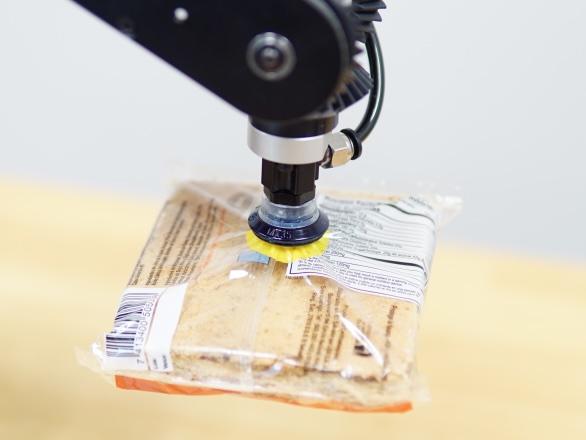
Whilst automation can save on labour costs, there are other business benefits to be had in the field of materials handling.
In today's fast-paced world, efficiency is paramount. Businesses strive to streamline their operations, optimise processes, and enhance productivity to stay competitive.
One area where technological advancements have truly revolutionised the landscape is material handling operations.
Automation, in particular, has emerged as a game-changer, offering a myriad of benefits that propel businesses towards greater success.
Where in the supply chain is material handling required?
Material handling plays a pivotal role in ensuring the secure and efficient transportation of materials and products across various stages of the supply chain, spanning from manufacturing to distribution. These are the different ways it is implemented:
In the manufacturing phase, material handling is instrumental for the movement and organisation of inbound goods within storage spaces or warehouses.
During transportation, material handling is utilised to assemble goods onto pallets, facilitating their seamless transport to designated warehouse storage locations.
In storage, material handling is essential for the safe unloading of goods onto designated storage areas or shelves, where they are carried to further distribution.
In the distribution phase, material handling is crucial for the loading of goods onto trucks, often employing equipment like forklifts, in preparation for delivery to retailers, wholesalers, or end customers.
What does automation involve?
Automation in material handling encompasses a wide range of technologies, from robotic arms and conveyor systems to autonomous vehicles and smart warehouses. These innovations are transforming traditional methods of moving, storing, and managing materials, paving the way for unprecedented efficiency gains and cost savings.
Automated Material Handling Systems (AMHS) represent cutting-edge technological solutions engineered to streamline the movement, storage, and retrieval of materials or products within various sites, including warehouses, distribution centres, and manufacturing plants.
These might include conveyor systems, robotic systems, automatic guided vehicles (AGVs), automated storage and retrieval systems (AS/RS) ,sortation systems or automated packing systems.
Increased productivity and accuracy
By substituting or complementing manual labour with automated processes and machinery, these systems are engineered to enhance operational efficiency, precision, and productivity.
One of the most significant advantages of automation in material handling is the dramatic increase in productivity. Automated systems can perform tasks with speed and precision beyond human capabilities, leading to faster throughput and reduced cycle times.
Whether it's picking and packing orders in a distribution centre or sorting packages in a logistics hub, automation minimises delays and bottlenecks, ensuring smoother operations and faster order fulfilment.
Moreover, automation enhances accuracy and reliability in material handling processes.
Human error, a common occurrence in manual operations, is virtually eliminated, leading to fewer mistakes and reduced rework. Automated systems are programmed to execute tasks with consistent precision, resulting in improved inventory accuracy, reduced shrinkage, and enhanced customer satisfaction.
A happier workforce
By automating boring, monotonous, messy and dangerous jobs, employees are then able to develop other skills and focus on more interesting tasks. As a result, the workforce is more engaged and motivated which then leads to improved service levels. In addition to increased productivity within an existing operation, automation could lead to alternative and more profitable workflows being introduced into a logistic operation.
In addition to productivity and accuracy, automation delivers significant cost savings for businesses. While the initial investment in automated systems may seem substantial, the long-term benefits far outweigh the costs.
By streamlining operations, reducing labour requirements, and minimising downtime, automation drives down operational expenses and boosts overall profitability. Furthermore, automation enables businesses to optimise space utilisation, reducing the need for excessive storage facilities and lowering land and building costs.
Health & Safety
Another compelling benefit of automation in material handling is improved workplace safety. Manual handling of heavy or hazardous materials poses risks to workers, ranging from musculoskeletal injuries to accidents and fatalities.
Automation mitigates these risks by taking over repetitive, physically demanding tasks, thereby minimising the likelihood of workplace injuries and ensuring a safer working environment for employees.
Adaptability
Automated systems can be programmed and configured to adapt to multiple tasks quickly, making them flexible and versatile in handling different materials. Hence automation empowers businesses to adapt to changing market dynamics and customer demands with greater agility.
Flexibility is key in today's dynamic business environment, and automated systems can be easily reconfigured or scaled up/down to accommodate fluctuations in demand or changes in product mix. Whether it's seasonal peaks, sudden spikes in orders, or shifts in consumer preferences, automation enables businesses to respond swiftly and efficiently, without compromising on quality or service.
Sustainable
Automated electric trucks are not only quiet and emission-free, but they require no lighting to carry out their tasks, so work can continue in darkness offering considerable savings on electricity usage.
Additionally, automation enhances visibility and control over material handling operations. Advanced sensors, RFID tags, and IoT devices provide real-time data and insights into inventory levels, asset tracking, and order status. This visibility enables businesses to make informed decisions, optimise workflows, and proactively address issues before they escalate, leading to improved efficiency and customer satisfaction.
Material handling automation offers the potential to transform a business by promoting a more efficient, cost-effective, and competitive environment while prioritising employee safety and environmental responsibility.
Future-proofing operations
Automation is revolutionising material handling operations, unlocking unprecedented levels of productivity, accuracy, cost savings, safety, and agility for businesses across industries.
Embracing automation is not just about staying competitive; it's about future-proofing operations and positioning businesses for sustained success in an increasingly complex and demanding marketplace.
As technology continues to evolve, the possibilities for automation in material handling are limitless, promising even greater advancements and efficiencies in the years to come.